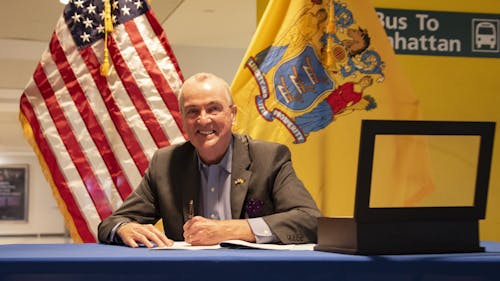Murphy signs executive order ending public health emergency in NJ

Gov. Phil Murphy (D-N.J.) signed an executive order today ending New Jersey’s coronavirus disease (COVID-19) public health emergency that has been in place since March 9, 2020 after many of the state’s restrictions have been lifted and numbers continue to improve, according to a press release.
“Today’s lifting of the COVID-19 Public Health Emergency is a clear and decisive step on the path toward normalcy,” he said. “The past 15 months have been a challenge, and I thank every New Jerseyan who stayed home, masked up, took precautions to keep this virus in check and got vaccinated for allowing us to get to this point.”
In addition, all indoor gathering limits were removed entirely today and the 30 percent limit on large indoor venues with a fixed seating capacity of 1,000 or greater was lifted as well, as previously reported by The Daily Targum.
Murphy also signed legislation that will allow for his administration to retain certain powers to manage the pandemic going forward despite the end of this emergency, according to the release. It will include the ability to issue orders, directives and waivers that are related to different areas of the COVID-19 pandemic such as vaccination efforts, testing, data collection and allocation of health resources and personnel.
These abilities will last until Jan. 11, 2022, and can be extended by 90 days upon an additional resolution, according to the release.
While the law will get rid of the majority of Murphy’s prior pandemic-related executive orders, it will keep 14 of the orders, including the state’s current mask guidelines, according to the release. These orders will be kept in place until Jan. 1, 2022 but can be altered or repealed by Murphy before this date.
The legislation will also restore the seven-day requirement for Open Public Records Act responses for records unrelated to the COVID-19 response and will set an expiration date of Sept. 1 for civil and criminal immunity provided to health care professionals, facilities and current waivers of regulations dealing with staffing ratios, overtime, shifts and vacation time, according to the release.
Only health care professionals specifically involved with COVID-19-related vaccinations and testing will continue to have civil immunity beyond this set expiration date going forward.
Additionally, Murphy announced at his 200th COVID-19 press conference on Wednesday that the state will begin to transition away from its mega site vaccination model toward a more community-based model, with nearly 1,800 vaccination sites now located across New Jersey.
Today is the last day that the Bergen County mega site will be offering first doses to individuals, and both the Gloucester and Atlantic County sites have already stopped providing first shots, he said. The last dates of first and second doses offered by all mega sites are scattered throughout June and July.
As of Wednesday, Murphy said that 1,967,235 total doses were administered at all of the mega sites combined over the past five months, with 954,204 individuals getting fully vaccinated at these sites.
“This in no way means that our job is done or that we’ve accomplished our overall vaccination goals. We still have work to do,” he said. “But, as I have said, we are now at the point where our attention will be focused on the local and community-based sites who have spent the better part of the past six months building and supporting.”
A total of 8,802,099 vaccine doses have been administered across the state as of today, with approximately 4,303,321 individuals being fully vaccinated overall, according to the New Jersey COVID-19 Dashboard.
The state also received a total of 304 new positive polymerase chain reaction (PCR) tests, bringing the statewide total to 888,507 positive cases, according to the dashboard. They also received 84 new positive antigen tests to increase the total of probable cases to 128,830.
Murphy said in an Instagram post today that for the first time in eight months the number of COVID-19 hospitalizations in New Jersey has reached below 500, with there currently being 479 hospitalizations.
“As we keep advancing our vaccination goals, we continue to reach new milestones in our fight to defeat this virus,” he said.



